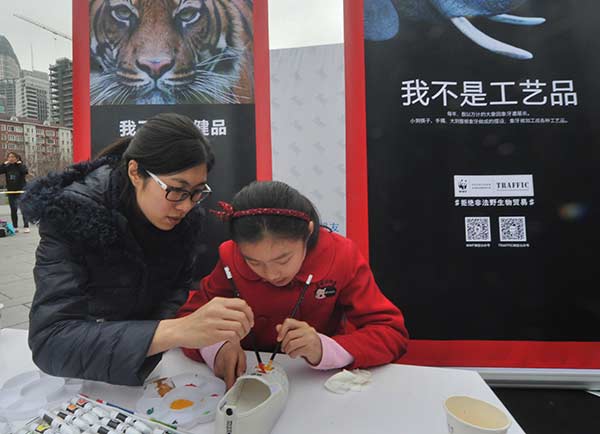Draft law eases curbs on foreign NGOs in country
Xinhua, April 26, 2016 Adjust font size:
 |
|
A child attends an Earth Hour activity in Shanghai in March calling for environmental protection. The event was started in 2007 by the WorldWide Fund for Nature, an environmental NGO. CHINA DAILY |
Rapid expansion has made the new provisions for certain groups 'necessary', lawmaker says
A draft law to regulate NGOs from outside the Chinese mainland eases restrictions on their operations and activities.
The bill was submitted for its third reading to the bimonthly session of the National People's Congress Standing Committee, which runs from Monday to Thursday.
Xu Xianming, deputy head of the NPC Law Committee, said the bill regulates the activities of overseas NGOs in China and protects their rights and interests.
Many overseas NGOs have engaged in charity and academic exchanges in China and have played a positive role since the reform and opening-up drive started in the late 1970s.
"Since their number has grown quickly and their activities have intensified, it is necessary to have a law to regulate and guide them," Xu said.
Exchanges and cooperation between Chinese and overseas colleges, hospitals and research institutes of science and engineering will follow existing regulations.
The bill removes the restriction of only one office for NGOs on the Chinese mainland, though their number and locations must be approved by the regulatory authority.
The five-year limit on operations of representative offices in China will also be deleted.
Representative offices of overseas NGOs and overseas NGOs carrying out temporary activities in China are forbidden from recruiting members on the mainland without the permission of the State Council.
The restrictions on staff and volunteers will be removed, but tougher rules would be imposed on finances, including sources of funds and expenses. They should have their financial reports audited and published.
The proposed new law stipulates that overseas NGOs should report to the regulator 15 days before their program begins, and their Chinese partners should obtain approval.
The bill allows the police to interview chief representatives and senior executives of overseas NGOs, and force the Chinese partner to terminate a cooperation program if it is considered to undermine State security.
Overseas NGOs that engage in illegal activities, including those to subvert the State and split the nation, will be blacklisted and banned from operating on the mainland.
Other drafts to be discussed
Public cultural services
A draft law to protect public cultural services was handed to the NPC Standing Committee for discussion on Monday. It clarifies requirements for building public culture facilities and improving cultural products and activities, in a move to satisfy demand and push related industries' development. Facilities identified in the draft include a library, technology museum and stadium. Where to build such facilities should be subject to public opinion, the draft said, and no one should change or occupy such places.
Wildlife protection
The revised draft Law on Protection of Wildlife was presented to top legislature for second reading on Monday. If passed, it would be the first revision of the law since it took effect in 1989. The revised draft has so far incorporated five amendments based on public concerns about wildlife protection.
National defense
The draft Law on National Defense Transportation was submitted to the top legislature on Monday. The draft is the first legislation made for the military since November 2012. It aims at regulating the People's Liberation Army's transportation and improving the military's strategic projection capability, according to experts.